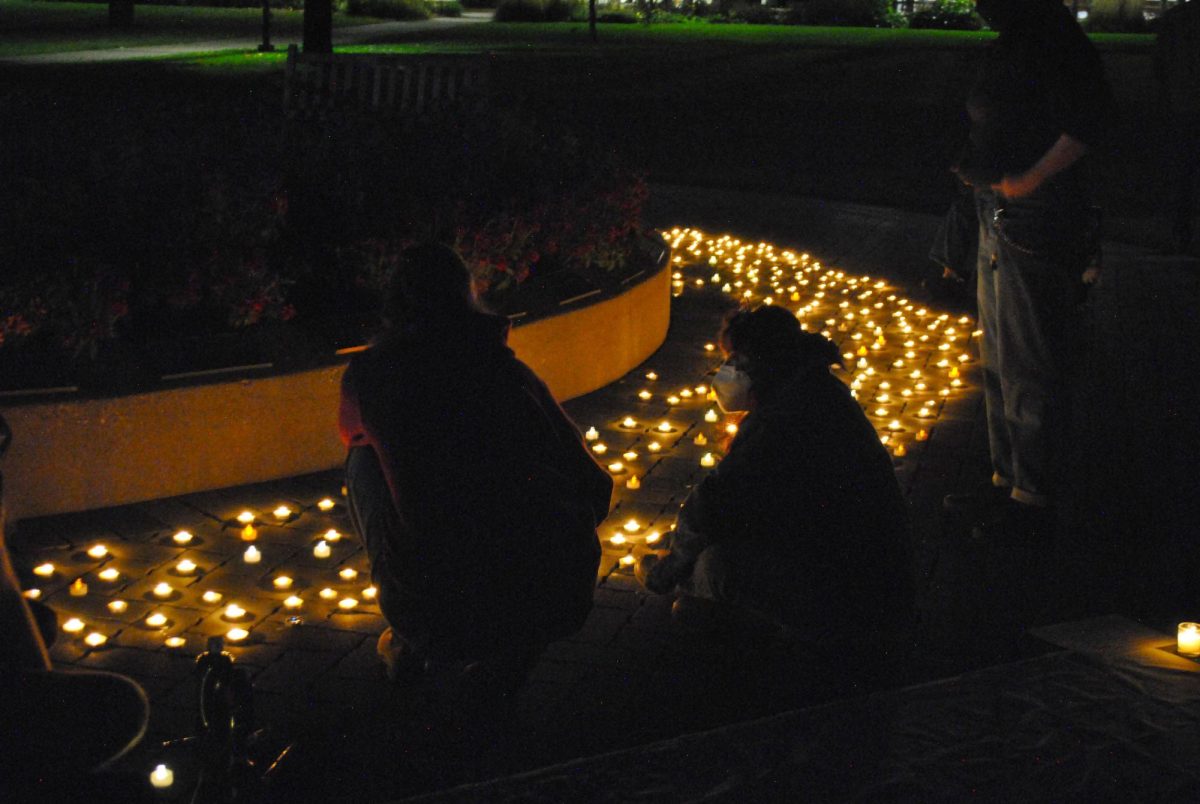Last year, Adelante and IfNotNow, along with other student organizations, co-sponsored a vigil on Nov. 7, 2023, in memory of what was then more than 11,000 Palestinians and more than 1,100 Israelis who died as a result of the violence in Gaza.
11 months later, on Oct. 8, Adelante, IfNotNow, Mac for Palestine and Human Rights at Macalester College held another vigil; this time, they grieved the deaths of more than 41,000 Palestinians and 1,139 Israelis.
In addition to a mounting death toll, Israel’s genocide of Palestinians has resulted in the destruction or damage of 87 percent of schools and 68 percent of road networks in Gaza. On Sept. 23, 2024, violence expanded into Lebanon, with Israeli airstrikes in southern Lebanon that left more than 500 dead. Bodies in both Lebanon and Palestine are still being uncovered under rubble. In response, Iran launched a missile attack, mostly deflected by U.S. provided rockets. On Oct. 8, Israel also launched an attack that hit a residential building in Damascus, Syria.
On Macalester’s Great Lawn, organizers arrived at 6:20 p.m. to begin laying out a blank, white banner for community members to artistically express their grief and place candles beneath the flagpole in preparation for the programming at 7 p.m.
The programming began with a peace prayer and included speakers from the student organizations that co-organized the event, as well as a high school teacher and a speaker from Mac Faculty and Staff for Palestine. In their speeches, each speaker reflected on how their organization’s values and focus called for solidarity with Palestinians.
A speaker representing IfNotNow and Mac for Palestine, who asked to remain anonymous, articulated why they believe that Macalester’s financial divestment from weapon manufacturers that support Israel is necessary to protect Macalester students.
“There are Palestinian students here at Macalester whose communities have witnessed the consequences of these home demolitions,” the speaker said. “This is not some abstract concept that exists out in the world that does not affect us here, but our classmates have seen their communities destroyed and their homes threatened by these companies that our institution has invested its money in.”
Participants painted and drew images of olive trees, a native plant to Palestine, as well as watermelon, which originally emerged as a Palestinian symbol of resistance after Israel banned publicly flying the Palestinian flag in occupied territories following the 1967 war. A board member of Adelante, who wished to remain anonymous, reproduced an outline of the artwork originally featured on the poster advertising the event.
The anonymous student views the vigil as an opportunity to show solidarity by representing not only diverse student orgs but also cultural and artistic forms of solidarity. Historically, murals have served as a means of political and personal expression within international movements across Latin America in service of the community’s grief. As an international student they believe that solidarity should be expected, regardless of direct proximity to Palestinian causes.
“I invite international students to engage in solidarity with the Palestinian cause,” the anonymous student said. “I invite cultural organizations to gather around moments of struggle because you never know when we could be next, which is one of my biggest fears. And I would expect my friends, and those who I hug and those who I dance with and those who I hold dear and call family while abroad to have that kind of compassion and that kind of strength.”
The vigil concluded with Mac Faculty and Staff for Palestine representative and sociology professor Khaldoun Samman’s reading of the 1964 poem “Identity Card” by Palestinian poet Mahmoud Darwish, which was originally written in Arabic.
After one year of organizing for Palestinian liberation, Mac Faculty and Staff for Palestine member and Adelante faculty advisor Olga González left the vigil, sensing and feeling exhaustion and a continuous commitment to working towards liberation for Palestinians at the same time.
“Apart from everything that we do [that] can exhaust us, it can be exhausting to be listening and learning about so much horror every day,” González said. “But that’s what I’m saying. That will not defeat us. The exhaustion — it’s okay. We can admit that we are exhausted, emotionally, exhausted. But that, to me, is only a sign that we have to keep on going and that we will not be defeated.”
González shared that her experience organizing and participating in marches for peace in Peru during the Peruvian Internal Conflict — which occurred primarily from 1980-2000 but still impacts those living in Peru today — has taught her that solidarity can help push through moments of fear and exhaustion.
“Marching in solidarity to demand peace, but also to counteract our fear was very powerful, very powerful,” González said. “And that is what I think I have learned: how to manage my fear through being in community and solidarity with different groups.”











